Publications
For submission of articles or Working Papers to CEsA, please send an email to:
comunicacao@cesa.iseg.ulisboa.pt
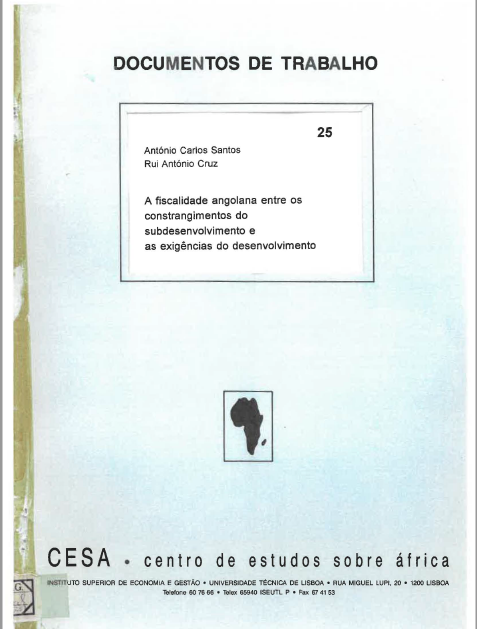
Working Paper 25/1993: A fiscalidade angolana entre os constrangimentos do subdesenvolvimento e as exigências do desenvolvimento
Abstract:
The determining factor of Angolan taxation from the beginning of colonial times to the present day has been the permanence, albeit with different characteristics, of a situation of underdevelopment. In fact, the way in which the Angolan tax system has evolved is deeply marked by this reality. But if this is the main feature of continuity, other factors exist that allow the establishment of ruptures or discontinuities and thus legitimize the possibility of talking about different phases of the system’s evolution. It has long been known that there is a strong correlation between the development process (socio-economic, political) and the structure and technique of tax systems. In A fiscalidade angolana entre os constrangimentos do subdesenvolvimento e as exigências do desenvolvimento we look upon several constraints arising from underdevelopment thus weigh on tax systems. Among them, the existence of small and poorly diversified tax bases, the difficulties in taxing real income, with permanent recourse to presumption methods, the unreliability of accounting systems, the almost always excessive weight of taxes on foreign trade can be mentioned. , the difficulties in administering taxes due to the lack of qualified personnel and technical, IT and logistical resources, with the consequent increase in tax evasion, the incipient tax awareness of taxpayers and the deficient juridification of the sector in its various facets (legislative technique, information legal, doctrinal elaboration, role of the courts, guarantees of taxpayers, etc.). Angola did not escape these characteristics.
Quotation:
Santos, António Carlos e Rui António Cruz. 1993. “A fiscalidade angolana entre os constrangimentos do subdesenvolvimento e as exigências do desenvolvimento”. Instituto Superior de Economia e Gestão. CEsA – Documentos de Trabalho nº 25/1993.
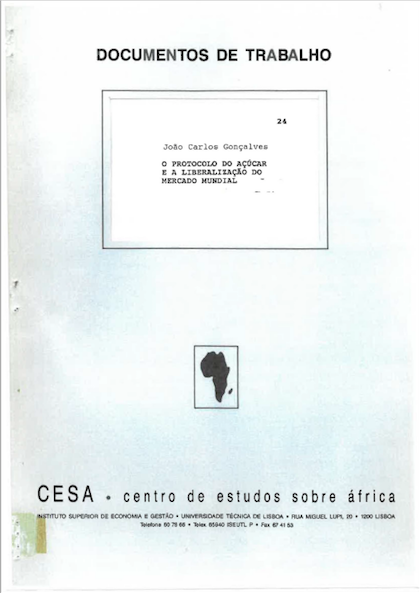
Working Paper 24/1992: O protocolo do açúcar e a liberalização do mercado mundial
Abstract:
O protocolo do açúcar e a liberalização do mercado mundial is justified by the importance that is currently given to the negotiations of the 8th GATT Conference, and their likely implications for the Common Agricultural Policy and for the ACP countries that maintain a close commercial relationship with the Community, embodied in the Lomé agreements. The objective is fundamentally to determine the possible implications for the ACP countries of the liberalization of agricultural trade, in terms of the sugar product. For this, we will analyze a set of indicators related to sugar production, export volume, level of Gross Domestic Product, export quotas and productivity levels for each of the ACP countries with a quota in the Sugar Protocol. The conclusions that may be drawn from this research will always have to take into account the time frame of statistical data availability, which in most cases refers to 1985 or 1987 as the closest years. The methodology that was followed essentially sought to ensure an evolution in the analysis. Starting from the characterisation and importance of the Sugar Protocol in the economies of the ACP countries and raising certain questions that the ACP countries face with regard to the future of their sugar sector, an attempt was made, by comparing hypotheses on world market sugar prices, to determine which ACP countries are in the best position to support a liberalisation of the world sugar trade.
Quotation:
Gonçalves, João Carlos. 1992. “O protocolo do açúcar e a liberalização do mercado mundial” . Instituto Superior de Economia e Gestão. CEsA – Documentos de Trabalho nº 24/1992.
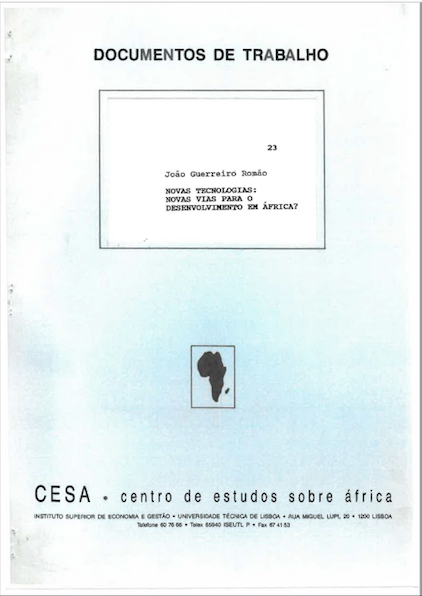
Working Paper 23/1992: Novas tecnologias: novas vias para o desenvolvimento em África
Abstract:
As the title of this work suggests, the aim is to assess to what extent new technologies are the best option for the development of African countries. The question of technological options as an instrument of economic development has already been addressed many times, without much success in terms of results: underdevelopment is far from being overcome. It is therefore not a matter of consensus. In an increasingly globalised world, where a wide variety of factors influence each phenomenon, uncertainty and unforeseen evolution call into question all theoretical formulations, all concepts, even the legitimacy of the questions we raise. The overwhelming victory of doubt in this, as in most fields. It then becomes urgent to review and criticise our heritage of theoretical formulations and, by posing new questions, to find new ways of approaching an old problem. This is what it is about Novas tecnologias: novas vias para o desenvolvimento em África: the framework was defined (diagnosis of technological underdevelopment and listing of the main questions facing technological choices) and a critique of the answers given so far was made in order to try to start a new approach, incorporating relatively new concepts. In this new framework, an answer is sought. Doubtful, always. But it tries, in the field of technological choices, to synthesise new ideas to find new paths.
Quotation:
Romão, João Guerreiro .1992, “Novas tecnologias: novas vias para o desenvolvimento em África” . Instituto Superior de Economia e Gestão. CEsA – Documentos de Trabalho nº 23/1992.
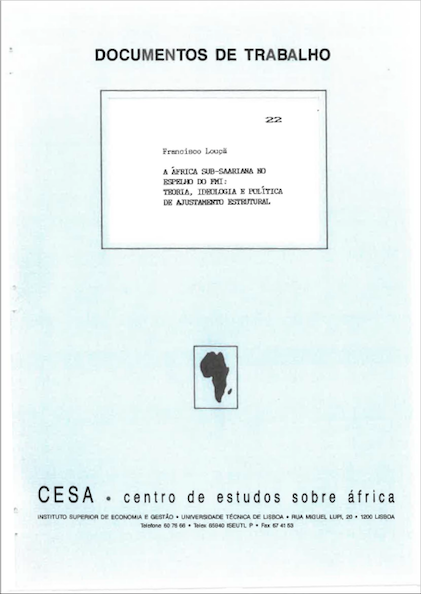
Working Paper 22/1991: A África sub-saariana no espelho do FMI: teoria, ideologia e política de ajustamento estrutural
Abstract:
The International Monetary Fund and the World Bank are undoubtedly two of the most powerful institutions from the point of view of international economic relations. That power has been growing and, in recent years, has acquired an expressive dimension in regulating the economic policy of an increasingly large number of national states: the general orientation that underlies the exercise of that relationship and a comprehensive ideology, which aims both to explain the reasons for the failure of previous economic models and to point out the short- and medium-term solutions for economic and social growth. Thus, never before have so many states simultaneously applied such standardised economic policies as those now resulting from IMF-WB-driven agreements. This is the starting point of A África sub-saariana no espelho do FMI : teoria, ideologia e política de ajustamento estrutural. This historical particularity facilitates the development of the present study. It is possible to approach the economic policies implemented within the framework of “structural adjustments” simultaneously by analysing previous developments, suggesting short-term measures, defining medium-term horizons – and within the framework of economic theory, social policy, development ideology, government action or social agents. And what follows, at the limit of an initial approach to the problem.
Quotation:
Louçã, F. (1991). A África sub-saariana no espelho do FMI : teoria, ideologia e política de ajustamento estrutural. Instituto Superior de Economia e Gestão. CEsA – Documentos de Trabalho nº 22/1991.
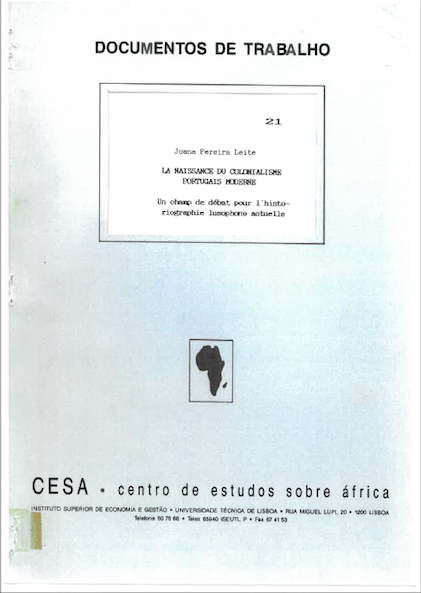
Working Paper 21/1991: La naissance du colonialisme portugais moderne: un champ de débat pour l’historiographie lusophone actuelle
Abstract:
The intention to “make history” of Portuguese colonial policy brought us to the heart of a debate, the centre of Portuguese-speaking historiography: the problematic of the “origins of modern Portuguese colonialism” or “The Third Portuguese Empire”. These new interpretations have, in our opinion, their roots in the “old” debates on the problematic of the “genesis of Portuguese decadence”, especially among the Portuguese-speaking historians of the XVIII and XIX centuries. The origins of modern Portuguese colonisation cannot be understood outside the dynamics of Portuguese society in the 19th century. Thus, the history of Portuguese colonialism in Africa is highly dependent on the analyses proposed by the current historiography of the 19th century in Portugal. It is not our intention, in La naissance du colonialisme portugais moderne: un champ de débat pour l’historiographie lusophone actuelle, to reconcile the two positions mentioned above. However, we cannot resist the temptation to recall here that if it is true that economic interests existed in modern African colonisation, and this under the guise of the historical respect that had to be paid to the heroes of the discoveries (keystones of colonial ideology throughout the history of the Portuguese Empire), the Portuguese fragility in the negotiations that led to the partition was just as true. Moreover, Portugal always put forward its historical right to its African possessions, as it was unable to impose itself through “economic arms”. We shall have the opportunity to recall how this position, in relation to historical rights, was maintained throughout the colonial period, becoming a superior value of the Salazarist ideology.
Quotation:
Leite, Joana Pereira. 1991. “La naissance du colonialisme portugais moderne : un champ de débat pour l’historiographie lusophone actuelle”. Instituto Superior de Economia e Gestão. CEsA – Documentos de Trabalho nº 21/1991.
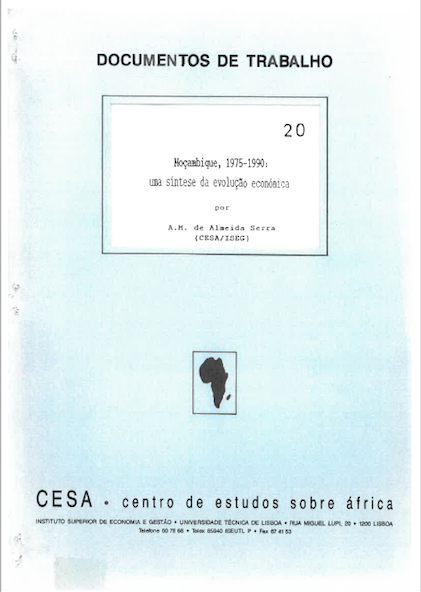
Working Paper 20/1991: Moçambique, 1975-1990: uma síntese da evolução económica
Abstract:
A first indication of the evolution of the Mozambican economy during the period 1975-85 is given by the evolution of the Overall Social Product (GSP). At constant 1980 prices, this product varied between about 112 million escudos in 1973 and about 54 million escudos in 1985, with 71 million escudos in 1975. Between 1973 and 1985 there was a reduction of about 50% in GSP. The accounting of production in terms of SGP is that which characterises the national accounting of the countries with centrally directed economies such as those of Eastern Europe and gives rise to different figures from those resulting from the use of the national accounting system of the OECD, characteristic of the market economy countries. The main objective of Moçambique, 1975-1990: uma síntese da evolução is to present in an autonomous way that same behavior and simultaneously. extend to the present – or rather, due to the limitations of availability of statistical information until 1990 – the analysis then carried out. In this work, therefore, we are dealing with an effort more to · describe the Mozambican economic evolution than to interpret its causes. However, we will not fail to make some interpretation of the data provided. In point I, we will address the situation that unfolded between 1975 and 1985. We will only briefly refer to the period immediately prior to independence. In point II we will approach the evolution verified in the second half of the 80s.
Quotation:
Serra, António de Almeida . 1991. “Moçambique, 1975-1990: uma síntese da evolução”. Instituto Superior de Economia e Gestão. CEsA – Documentos de Trabalho nº 20/1991.
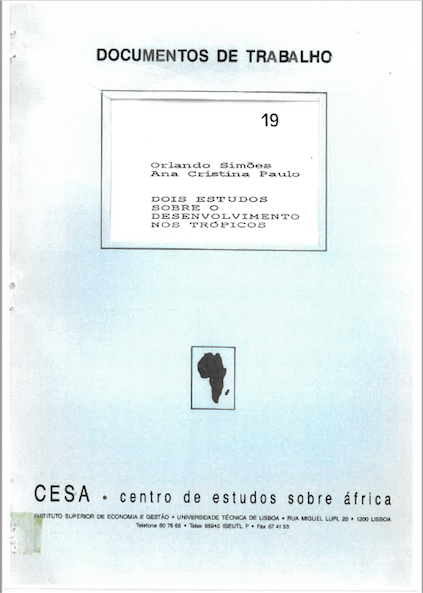
Working Paper 19/1990: Dois estudos sobre o desenvolvimento nos trópicos
Abstract:
Deforestation in the tropics is currently one of the major regional and global ecological problems, given the impact it may have on the imbalance of the agro-forestry ecosystems specific to those regions and the populations living there, as well as on climate change and global biogeochemical cycles. In the Working Paper Dois estudos sobre o desenvolvimento nos trópicos, we will attempt to briefly present the main causes and consequences of deforestation in the tropics, particularly with regard to African countries, and to critically put forward the solutions that have been advocated to overcome the current situation, demonstrating that only a combination of all of them can obviate the negative results of deforestation both at the ecological level and at the economic and social level of the populations affected by it. In the development programmes supported by the IMF and World Bank, the role of these institutions is important not only for their financing capacity, but also because of the agreements signed with the governments of the developing countries for which these programmes are intended, giving confidence to the private international financial institutions that can thus participate in these programmes.
Quotation:
Simões, Orlando e Ana Cristina Paulo .1990. “Dois estudos sobre o desenvolvimento nos trópicos”. Instituto Superior de Economia e Gestão. CEsA – Documentos de Trabalho nº 19/1990.
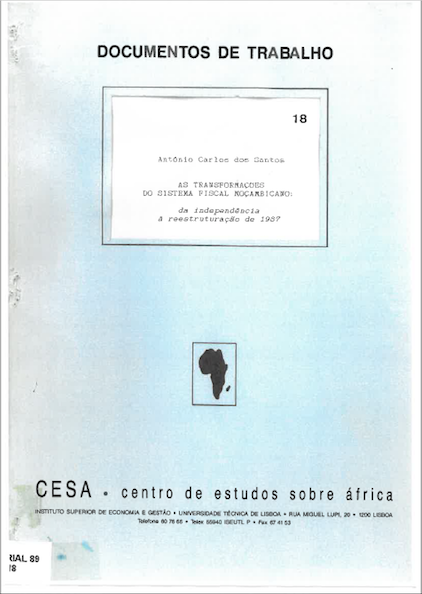
Working Paper 18/1989: As transformações do sistema fiscal moçambicano: da independência à reestruturação de 1987
Abstract:
In As transformações do sistema fiscal moçambicano : da independência à reestruturação de 1987 we study how on the eve of independence, the Mozambican tax system (SFM) (1) was, in terms of tax and legal technology, deeply influenced by the tax system of the then metropolis (arising from the 1959-63 reform) and by its project to carry out a of “fiscal harmonisation” within the framework of the so-called “economic integration of the Portuguese space”. At the very first session of the Council of Ministers, in July 1975, the Ministry of Finance was entrusted with the task of establishing a tax system in accordance with the principles defined in the Constitution, that is, adapting the tax system to the new political-economic guidelines proclaimed by the RPM and make it contribute to the tasks of National Reconstruction (4). Under the terms of article 13 of the Constitution of the RPM, it was about subjecting income and private property to progressive taxes, established according to criteria of social justice and in accordance with the defined fiscal policy, mobilizing financial resources for the consolidation of the structures of the new State and satisfaction of basic needs (5). Taking into account the changes introduced to date by the reform initiated in 1987, it can be said that the Mozambican tax system is essentially constituted by taxation – in installments of income according to its sources (profits, wages, rents), supplemented by a tax complementary with progressive and, to a certain extent, personalization objectives, as well as by various specific tax regimes. In terms of indirect taxation, due to their growing financial importance, internal taxes on goods and services (traffic tax and consumption tax) should be highlighted. seal. The system is complemented by a capitation tax (the National Reconstruction tax) and two former property taxes (the sisa and the inheritance and gift tax) (13).
Quotation:
Santos, António Carlos dos. 1989. “As transformações do sistema fiscal moçambicano : da independência à reestruturação de 1987” . Instituto Superior de Economia e Gestão. CEsA – Documentos de Trabalho nº 18/1989.
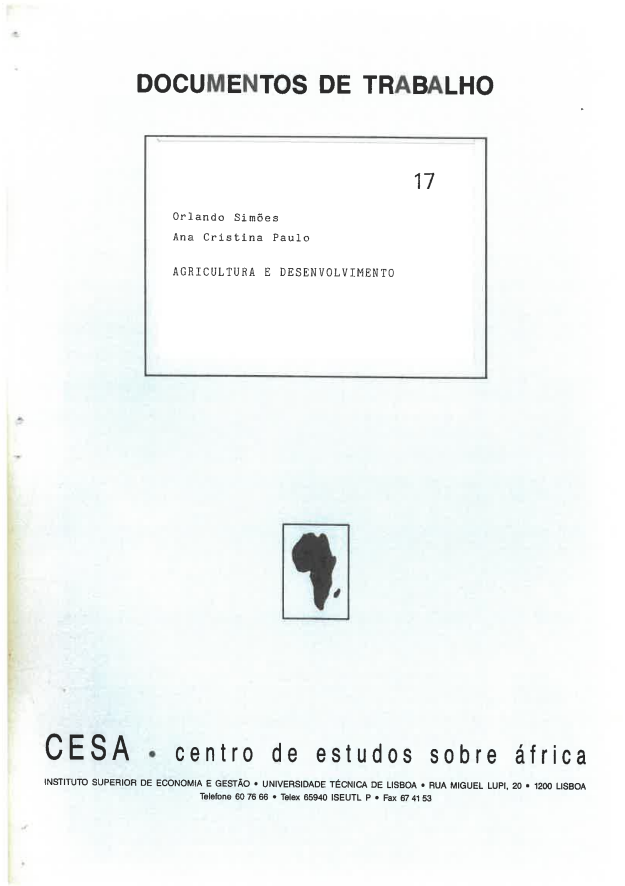
Working Paper 17/1989: Agricultura e desenvolvimento
Abstract:
In Agricultura e Desenvolvimento we study how the policy followed in the introduction of biotechnologies in developing countries during the last decades has closely followed the evolution of concepts and theories on the problem of development. Faced with the food shortage of developing countries created by the population explosion from a more effective control of mortality, especially infant mortality, the need was felt to rapidly increase food production in those countries. In a first phase of what became known as the “Green Revolution”, there was an intensification of the agri-food sector of some developing countries, namely in Asia and Latin America. This intensification was based on the massive importation of technology, inputs and know-how from the most industrialized countries, using new high-yield cereal varieties obtained by crossing, hybridization and artificial pollination techniques. The policy followed was in agreement with the concepts of development then dominant and based on the “conventional paradigm” (isolation of the economic dimension and universality of the pattern of development), advocating rapid economic growth following the model of industrialized countries. In the development programs supported by the IMF and World Bank, the role of these institutions is important not only for their financing capacity, but also for the agreements signed with the governments of the PVD’s for which these programs are intended, giving confidence to the private international financial institutions that can thus participate in these programs.
Quotation:
Simões, Orlando e Ana Cristina Paulo. 1989. “Agricultura e desenvolvimento” . Instituto Superior de Economia e Gestão. CEsA – Documentos de Trabalho nº 17/1989.
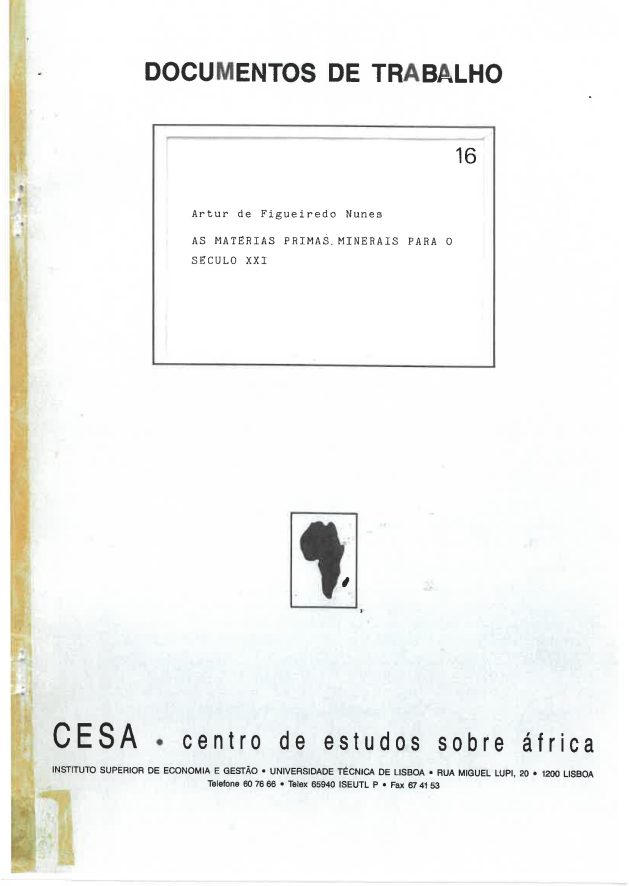
Working Paper 16/1989: As matérias primas minerais para o século XXI
Abstract:
In As matérias primas minerais para o século XXI we analyze how the last decades, the production of mineral raw materials has increased continuously. Certain drops, sometimes observed for some ores, are cyclical in nature and do not affect the general configuration of the growth curve. On the other hand, there has been a depletion of high-grade ore deposits, some of which have played an important role in the mining history of the world. Securing the supply of mineral products in the overpopulated world of the 21st century will therefore be a point worth serious consideration. With the world’s population growing at an impressive rate, what will be the situation for future generations with regard to access to mineral raw materials? The hopes we place in the progress of technology will not be totally unfounded. In recent years, man has been able to see technology overcoming barriers considered insurmountable. His hopes for the future development of activities in all fields of science and technology therefore have some justification, although they may perhaps be exaggerated. Considering the foreseeable possibilities of new technologies, which will enable us to draw on poor ores, gain access to marine deposits, raise scrap recycling to very high levels and make the use of substitutes commonplace – even then we will be obliged to review very carefully our attitude to the squandering of raw materials.
Quotation:
Nunes, Artur de Figueiredo. 1989. “As matérias primas minerais para o século XXI”. Instituto Superior de Economia e Gestão. CEsA – Documentos de Trabalho nº 16/1989.





